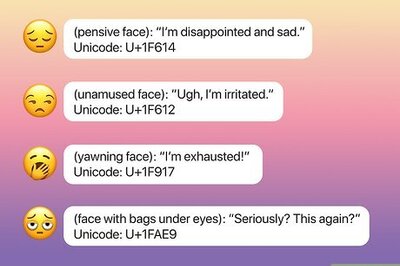
views
Which is perhaps why in the aftermath of the Congress's UP election debacle, the decision to send Gandhi junior to campaign in the state has attracted such fierce responses.
The Congress loyalists have insisted that the UP result is no reflection on Rahul's capability and he remains the prime minister-in-waiting. The opposition has gleefully suggested that Rahul's political ambitions have come unstuck and the Nehru-Gandhi family surname is no longer a ticket to power. The truth, as is often the case, lies somewhere in-between.
Lets be honest: the UP election was never going to be a referendum on Rahul Gandhi's leadership qualities. So, even while Rahul embarked on his own discovery of UP by landcruiser, and addressed over a hundred (large and small) meetings in the state, he was never pitched as a future chief minister of UP.
He was, at best, the Congress's star campaigner, someone whose presence the party had hoped would atleast galvanise the Congress rank and file into action, and help increase the party's vote share. As it turned out, the Congress vote share actually marginally declined and its seats went down. This is, at one level, a failure for which Rahul Gandhi must take some responsibility.
For one, it reveals the limitations of charisma in today's politics. To believe that Rahul Gandhi would draw in the votes by a mere wave of the hand on a whirlwind roadshow just a month before elections was not just gross political misjudgement, it exposes a certain naivete on the part of his campaign managers. That he often invoked the name of his "dadi-ma" and father in his speeches was again a bad error, stemming from a lack of understanding of the realities of contemporary politics.
A majority of voters, particularly in the caste cauldron of UP, vote in the direction of the party which provides opportunities in the present and hope for the future, not one which attempts to live on past glory.Constant references to "my family" provoked irritation among voters anxious for a better life for their own families.
A Rajiv Gandhi could harness his own politics to his mother's legacy in the 1980s, simply because Mrs Gandhi, especially after the circumstances of her death, was a larger than life figure. Rahul Gandhi has no such legacy to draw upon. A Rajiv Gandhi could make the transition from airline pilot to prime minister in double quick time because he lived in the TINA era of politics (there is no alternative).
A Rahul Gandhi cannot hope for a similar benefit in this era of coalition politics and regional satraps. A Rajiv Gandhi could get away with his limited Hindi vocabulary (remember, the classic "chahe hum jeete ya loosein"), because he lived in the age of Doordarshan's monopoly. In today's clutter of news channels, there is no place to hide. Which is why every stray remark, be it on Bangladesh or Babri Masjid, gets magnified and endlessly debated.
And yet, UP 2007 is less an indictment of Rahul Gandhi and more a failure of the party which he hopes to lead one day. The congress has no cadres and is a sick company in today's UP. From being a vote rich company in the 1980s (remember, the Congress won all 85 seats in UP in 1985) to being reduced to a minor rump, the decline has been steady and startling.
Identifying a Congress worker in UP is not difficult: usually nearing retirement age, he will recall the "sacrifices" of his leaders, will sermonize on secularism, and then retire into the shade with his Gandhi topi and torn party flag. The zest and zeal of fighting an election is almost completely non-existent, except to a limited extent in the Rae Bareli-Amethi family jagir.
The real ominous sign for the Congress though is that the disease of Uttar Pradesh is now in danger of spilling into an epidemic across the country. Take Goa for instance, the next state to go to the elections in just a few days from now. On election eve, the Congress resembles a disjointed, tattered army struggling to get its act together.
How else does one explain the ridiculous situation of the Congress chief minister's son fighting as an independent, and then getting the official party candidate to "withdraw" in his favour? Or of a senior minister in the Rane government leaving the party after getting nominated on the grounds that his wife too must be given a ticket? Or the party's mercurial MP, Churchill Alemao, breaking away to form his own group in the hope of damaging the Congress? Tiny Goa may count little in the larger national picture, but the fact that the Congress could be losing another state in which it is in power should be enough cause for alarm.
From Lucknow to Panaji, the common thread is that the Congress is operating like a 'closed shop', an ageing family business that is simply unable to respond to the aspirations of a more youthful population. Is it any surprise that in Goa, for example, the party eventually had to issue a diktat that only one ticket would be given per family?
With the party organization becoming a dumping ground for those whose ministerial ambitions have been scotched, its clear that the three years in power have only further eroded the institutional capacity of the Congress to become a more robust and electable entity.
Somehow, one senses that after her masterly 'sacrifice" of 2004, Sonia Gandhi has lost the plot. What the Congress desperately needs now is a 60s like Kamaraj-like plan in which ministers from the UPA government are brought into the party fold even while some of the more promising, younger faces are projected more vigorously. Unfortunately, the proposed organizational reshuffle of the Congress is now like a business plan which never seems to take off, a direct casualty of an existing structure where decision-making is routinely deferred and where lines of communication to the Supreme Leader are increasingly cut off.
Most successful companies in India are forced to come up with career growth plans to retain young talent. A family-run company like the Congress private limited needs to come to terms with the new realities of managing its employees and supporters. A family run business can only succeed if it empowers its managers and stakeholders in the fullest possible manner.
A regional party like the DMK may yet get away with family raaj because of the limited area of its influence. An umbrella, national party like the Congress cannot. What it needs now is to appoint some tough new CEOs and provide them opportunities to grow. Simply trotting out family charisma at election time without providing any opportunities for new talent in the party is a recipe for disaster.
Maybe Rahul Gandhi needs to 'professionalise" the Congress structure, not by relying on laptop managers, but by building a core team of political leaders who are connected to the people. He should, in a sense, be the face of this new Kamaraj plan. We must hear from him more often, he must be seen to take political positions more consistently. There is a rapidly changing India that exists beyond Amethi.
Let Rahul Gandhi go and engage with it now, not a few months before the next election. And this time maybe we could have fewer dimpled photo-ops, and a more searching examination of his political abilities. After all, he is 36 years now. Time to get rid of the cotton wool. About the AuthorRajdeep Sardesai Rajdeep Sardesai was the Editor-in-Chief, IBN18 Network, that includes CNN-IBN, IBN 7 and IBN Lokmat. He has covered some of the biggest stories in I...Read Morefirst published:May 25, 2007, 00:00 ISTlast updated:May 25, 2007, 00:00 IST
window._taboola = window._taboola || [];_taboola.push({mode: 'thumbnails-mid-article',container: 'taboola-mid-article-thumbnails',placement: 'Mid Article Thumbnails',target_type: 'mix'});
let eventFire = false;
window.addEventListener('scroll', () => {
if (window.taboolaInt && !eventFire) {
setTimeout(() => {
ga('send', 'event', 'Mid Article Thumbnails', 'PV');
ga('set', 'dimension22', "Taboola Yes");
}, 4000);
eventFire = true;
}
});
window._taboola = window._taboola || [];_taboola.push({mode: 'thumbnails-a', container: 'taboola-below-article-thumbnails', placement: 'Below Article Thumbnails', target_type: 'mix' });Latest News
In the furious debate in Britain over sending Prince Harry to Iraq, a royalist voice angrily remarked on a television show, "We cannot barter our future for an uncertain present." The Nehru-Gandhis are India's answer to the House of Windsor, and Rahul Gandhi is our very own Crown Prince.
Which is perhaps why in the aftermath of the Congress's UP election debacle, the decision to send Gandhi junior to campaign in the state has attracted such fierce responses.
The Congress loyalists have insisted that the UP result is no reflection on Rahul's capability and he remains the prime minister-in-waiting. The opposition has gleefully suggested that Rahul's political ambitions have come unstuck and the Nehru-Gandhi family surname is no longer a ticket to power. The truth, as is often the case, lies somewhere in-between.
Lets be honest: the UP election was never going to be a referendum on Rahul Gandhi's leadership qualities. So, even while Rahul embarked on his own discovery of UP by landcruiser, and addressed over a hundred (large and small) meetings in the state, he was never pitched as a future chief minister of UP.
He was, at best, the Congress's star campaigner, someone whose presence the party had hoped would atleast galvanise the Congress rank and file into action, and help increase the party's vote share. As it turned out, the Congress vote share actually marginally declined and its seats went down. This is, at one level, a failure for which Rahul Gandhi must take some responsibility.
For one, it reveals the limitations of charisma in today's politics. To believe that Rahul Gandhi would draw in the votes by a mere wave of the hand on a whirlwind roadshow just a month before elections was not just gross political misjudgement, it exposes a certain naivete on the part of his campaign managers. That he often invoked the name of his "dadi-ma" and father in his speeches was again a bad error, stemming from a lack of understanding of the realities of contemporary politics.
A majority of voters, particularly in the caste cauldron of UP, vote in the direction of the party which provides opportunities in the present and hope for the future, not one which attempts to live on past glory.Constant references to "my family" provoked irritation among voters anxious for a better life for their own families.
A Rajiv Gandhi could harness his own politics to his mother's legacy in the 1980s, simply because Mrs Gandhi, especially after the circumstances of her death, was a larger than life figure. Rahul Gandhi has no such legacy to draw upon. A Rajiv Gandhi could make the transition from airline pilot to prime minister in double quick time because he lived in the TINA era of politics (there is no alternative).
A Rahul Gandhi cannot hope for a similar benefit in this era of coalition politics and regional satraps. A Rajiv Gandhi could get away with his limited Hindi vocabulary (remember, the classic "chahe hum jeete ya loosein"), because he lived in the age of Doordarshan's monopoly. In today's clutter of news channels, there is no place to hide. Which is why every stray remark, be it on Bangladesh or Babri Masjid, gets magnified and endlessly debated.
And yet, UP 2007 is less an indictment of Rahul Gandhi and more a failure of the party which he hopes to lead one day. The congress has no cadres and is a sick company in today's UP. From being a vote rich company in the 1980s (remember, the Congress won all 85 seats in UP in 1985) to being reduced to a minor rump, the decline has been steady and startling.
Identifying a Congress worker in UP is not difficult: usually nearing retirement age, he will recall the "sacrifices" of his leaders, will sermonize on secularism, and then retire into the shade with his Gandhi topi and torn party flag. The zest and zeal of fighting an election is almost completely non-existent, except to a limited extent in the Rae Bareli-Amethi family jagir.
The real ominous sign for the Congress though is that the disease of Uttar Pradesh is now in danger of spilling into an epidemic across the country. Take Goa for instance, the next state to go to the elections in just a few days from now. On election eve, the Congress resembles a disjointed, tattered army struggling to get its act together.
How else does one explain the ridiculous situation of the Congress chief minister's son fighting as an independent, and then getting the official party candidate to "withdraw" in his favour? Or of a senior minister in the Rane government leaving the party after getting nominated on the grounds that his wife too must be given a ticket? Or the party's mercurial MP, Churchill Alemao, breaking away to form his own group in the hope of damaging the Congress? Tiny Goa may count little in the larger national picture, but the fact that the Congress could be losing another state in which it is in power should be enough cause for alarm.
From Lucknow to Panaji, the common thread is that the Congress is operating like a 'closed shop', an ageing family business that is simply unable to respond to the aspirations of a more youthful population. Is it any surprise that in Goa, for example, the party eventually had to issue a diktat that only one ticket would be given per family?
With the party organization becoming a dumping ground for those whose ministerial ambitions have been scotched, its clear that the three years in power have only further eroded the institutional capacity of the Congress to become a more robust and electable entity.
Somehow, one senses that after her masterly 'sacrifice" of 2004, Sonia Gandhi has lost the plot. What the Congress desperately needs now is a 60s like Kamaraj-like plan in which ministers from the UPA government are brought into the party fold even while some of the more promising, younger faces are projected more vigorously. Unfortunately, the proposed organizational reshuffle of the Congress is now like a business plan which never seems to take off, a direct casualty of an existing structure where decision-making is routinely deferred and where lines of communication to the Supreme Leader are increasingly cut off.
Most successful companies in India are forced to come up with career growth plans to retain young talent. A family-run company like the Congress private limited needs to come to terms with the new realities of managing its employees and supporters. A family run business can only succeed if it empowers its managers and stakeholders in the fullest possible manner.
A regional party like the DMK may yet get away with family raaj because of the limited area of its influence. An umbrella, national party like the Congress cannot. What it needs now is to appoint some tough new CEOs and provide them opportunities to grow. Simply trotting out family charisma at election time without providing any opportunities for new talent in the party is a recipe for disaster.
Maybe Rahul Gandhi needs to 'professionalise" the Congress structure, not by relying on laptop managers, but by building a core team of political leaders who are connected to the people. He should, in a sense, be the face of this new Kamaraj plan. We must hear from him more often, he must be seen to take political positions more consistently. There is a rapidly changing India that exists beyond Amethi.
Let Rahul Gandhi go and engage with it now, not a few months before the next election. And this time maybe we could have fewer dimpled photo-ops, and a more searching examination of his political abilities. After all, he is 36 years now. Time to get rid of the cotton wool.




















Comments
0 comment